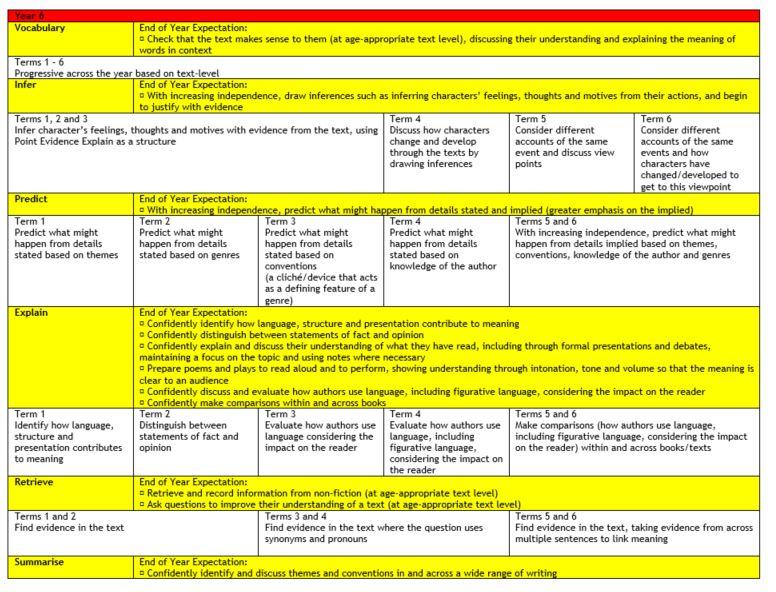Reading
Intent
We believe that a quality reading curriculum should develop children’s love of reading. We aim to inspire an appreciation of our rich and varied literary heritage and a habit of reading widely and often. We want to inspire children to be confident in the art of speaking and listening and who can use discussion to communicate and further their learning.
We believe that children need to develop confidence and fluency in reading, which follows a clear pathway of progression as they advance through the primary curriculum. Reading materials have been selected to build cumulatively and progressively. We believe that a secure basis in reading skills is crucial to a high quality education and will give our children the tools they need to be successful in their next stage of education.
Our children will leave with a love of reading, able to discuss books and compare works of key authors. At secondary school, they will be able to access the full curriculum offered and read both for knowledge- acquisition and pleasure.
Implementation
Reading is taught daily throughout the school in line with the National Curriculum (2014) for half an hour using a whole class approach.
We believe that ‘good readers are successful across the curriculum’. Therefore, children are exposed to high-quality, age-appropriate texts that cover a range of genres. Phonics is taught daily in Reception and KS1, and progresses to whole class reading on completion of the phonics programme after Easter in Year 2. All children graduate from Read, Write Inc. and begin whole class reading, starting with extracts from RWInc. comprehension which match their phonic ability with precision.
Children follow a set progression of skills through the content domains of the National Curriculum using the acronym of VIPERS to develop an ability to decode and comprehend the texts they read. This approach is reinforced whenever a child reads whether in school and parents are encouraged to focus on this at home.
To ensure our taught curriculum is a stepping stone to independent reading, two copies of the books from each extract are available to the children in their class libraries alongside other copies of their other works. To guide children into selecting these books to read independently, the extracts ensure children are exposed to ‘unmissable’ scenes, chapter ones and prologues - enticing the children to want to read on.
Reading is taught through a diverse and ambitious text spine of extracts that are cumulative and progressive in nature, where both the complexity in text level and themes addressed are built upon term-by-term. We use a ‘Read, Enrich, Explore’ approach to reading across the week (see below). The extracts are rich in cultural capital through the themes they address alongside the historical and geographic settings. Authors have been selected specifically to include a range of contemporary and relevant authors (which in turn provide relevant protagonists) alongside a purposeful mix of modern classic and classic texts that provide a step into wider reading for children. Non-fiction and poetry are also an integral part of the spine, where the non-fiction link to the ‘focus text’ of the writing curriculum.
Progression within the content domains in ensured through a rigorous document which progressively increase the understanding of each reading content domain term-by-term, year-by-year.
Teachers plan to the needs of their class by cross-referencing the assessment data obtained from the NTS reading assessments (see more detail below), where they find the content domains that the children need more teaching in and focus on these more heavily across a term than some of the content domains that the children are already more proficient at.
Each extract is pre-read as an intervention prior to the main learning sequence (where necessary) to the children who require additional input and who may need some extra time and practice with the decoding element of the text so that they come to the first lesson equipped with confidence and understanding to access the same learning as their peers working at ARE.
READ, ENRICH, EXPLORE
READ: On the first day of a new unit of work, challenging vocabulary is pre-taught to the class so that they have a solid understanding when they meet it in context. Subsequently, the children have the text read to them by the class teacher and the children follow on the page in front of them. The teacher’s focus is on modelling of pace, fluency and intonation. The lesson is concluded through Aidan Chambers’ ‘book talk’ model of ‘likes, dislikes, puzzles and patterns’ where the children discuss and explore the text they have been read.
ENRICH: As the texts are rich in their complexity and cultural capital, there may be elements that the children would struggle to comprehend at face value (for example, why one character looked at the other in a certain way, or a cultural reference that is integral to the comprehension of the extract). We mitigate this, if there is a need, and deepen the children’s understanding through an ‘enrichment’ task, which can comprise further reading, experience or additional discreet teaching that underpins the deep comprehension of the text. Once this is complete, the teacher reads the text for a second time, linking the enrichment to the comprehension and how they now have a deeper understanding; pausing to spaced-retrieve vocabulary and model ‘thinking aloud’ and authorial intent.
If this is not required as the teacher feels the children will comprehend the text on its first read, then the children complete a read aloud activity, such as reading at an appropriate pace, or giving characters voices.
EXPLORE: The following three lessons are where the children are equipped to study the text in depth, using the content domains of the National Curriculum. The lesson focuses on one content domain in the form of a VIPER for children and consists of a balance between formal comprehension questions and a wider, richer response to reading. Where formal comprehension questions are used, teacher modelling is apparent by working through a shared example as a class and highlighting the skills required before the children complete similar questions independently.
ASSESSMENT
Formative assessment takes place tri-annually across the trust using the NTS reading assessments. This data is used by leaders to measure the efficacy of reading and to hold teachers to account, and teachers use it to be assured of the content domain deficiencies that they need to address with their pupils.
CLASS READER
In addition to reading lessons, children are also exposed to a class novel for 15 minutes each day. The class novel is pre-selected so that the children are strategically introduced to a wide range of diverse literature that ensures that children have the opportunities to see themselves in books, underpinned by the theory of ‘windows, mirrors and sliding glass doors’. They have also been selected to run in parallel with the reading extracts in the reading lesson so that children have the opportunity to draw parallels in authorial styles and themes from a rich range of authors. The books themselves have been selected to address Lemov’s ‘five plagues of the developing reader’ with a sixth ‘year group focus author’ so that the children experience these texts in a forum that they can be guided through by their teacher and offer rich discussion points with their peers.
However, the most important element to our reading curriculum is that it provides each class teacher to be every child in their class’ reading role model.
Year 2
Text overview
|
Year 2 |
|
RWInc Comprehension Texts |
|
Module 1- Chicken-Licken Module 2- Anansi and the Four Bananas Module 3- The Wish Module 4- The Three of Us Module 5- Drusilla's Diary Module 6- The Cupboard Under the Stairs Module 7- Rose and Ruby Module 8- Mary Seacole Module 9- Teeth Module 10- The Class Trip Module 11- All About India Module 13- Bees Module 14- Atishoo! |
|
Additional Texts |
|
Legend of Spud Murphy- Eoin Colfer The Hundred-Mile An-Hour Dog- Jeremy Strong The Princess in Black- Bathtime Battle- Shannon and Dean Hale The Princess in Black- Shannon and Dean Hale |
|
Term 5 |
|
Daisy and the Trouble with Burglars- Kes Gray Daisy and the Trouble with Zoos- Kes Gray Dirty Bertie- David Roberts Fortunately the Milk- Neil Gaiman Horrid Henry's Underpants- Francesca Simon Sophie takes to the Sky- Katherine Woodfine |
|
Term 6 |
|
I Talk Like a River- Jordan Scott Little Badman- Humza Arshad & Henry White Sam Wu is not Afraid of Ghosts- Katie and Kevin Tsang The 13-Storey Treehouse- Andy Griffiths The Climbers- Ali Standish Toto the Ninja Cat- Dermot O'Leary |
Y2 - Progression within reading content domains
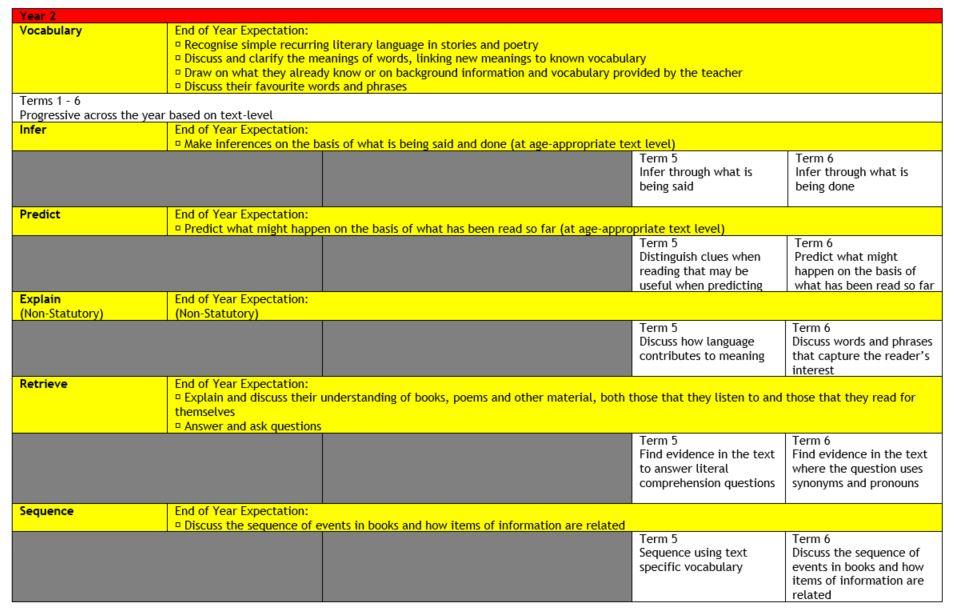
Year 3
Text overview
|
Year 3 |
|||
|
|
Fiction |
Non-Fiction |
Poetry |
|
Term 1 |
Story writing (character and setting description) |
Report writing (Q&A interview)
|
|
|
|
Stuart Little- E.B. White
Bill’s New Frock- Anne Fine
Diary of a Killer Cat- Anne Fine
Stig of the Dump- Clive King |
Stone Houses (Explanation)
Soil (Information) |
|
|
Term 2 |
Adventure stories |
Newspaper report |
|
|
|
Go Ahead, Secret Seven- Enid Blyton
The BFG- Roald Dahl
The Boy Who Grew Dragons- Andy Shepherd |
Food (Explanation)
Earth Charter (Newspaper)
Giant Refugee Puppet On Trek to UK (Newspaper) |
|
|
Term 3 |
Dialogue |
|
|
|
|
The Iron Man- Ted Hughes
Captain Apparatus (Diary)
The Lost Happy Endings- Carol Ann Duffy
The Hodgeheg- Dick King Smith
The Worst Witch- Jill Murphy |
Strange Predators (Information)
|
|
|
Term 4 |
|
Biography |
|
|
|
Mr Majeika- Humphrey Carpenter
Alex Sparrow and the Really Big Stink- Jennifer Killick |
Lonely Hearts (Narrative Biography)
Who was Robin Hood? (Information)
Shoot Like Robin Hood (Instructions) |
Walking With My Iguana- Brian Moses
Scissors- Allan Ahlberg |
|
Term 5 |
|
Persuasive letter |
|
|
|
Alice in Wonderland- Lewis Carroll
My Head Teacher is a Vampire Rat- Pamela Butchart
Nothing to See Here Hotel- Steven Butler |
Why Do Dragons Make Great Pets? (Persuasion)
The Wave (Letter) |
The Sound Collector- Rodger McGough |
|
Term 6 |
|
Balanced argument |
|
|
|
The Enchanted Wood- Enid Blyton
The Magic Faraway Tree- Enid Blyton
The Wild Robot- Peter Brown |
The British Coastline (Information)
Ocean Food Chain (Information) |
The Owl and the Pussycat- Edward Lear |
Year 3 - Progression within reading content domains
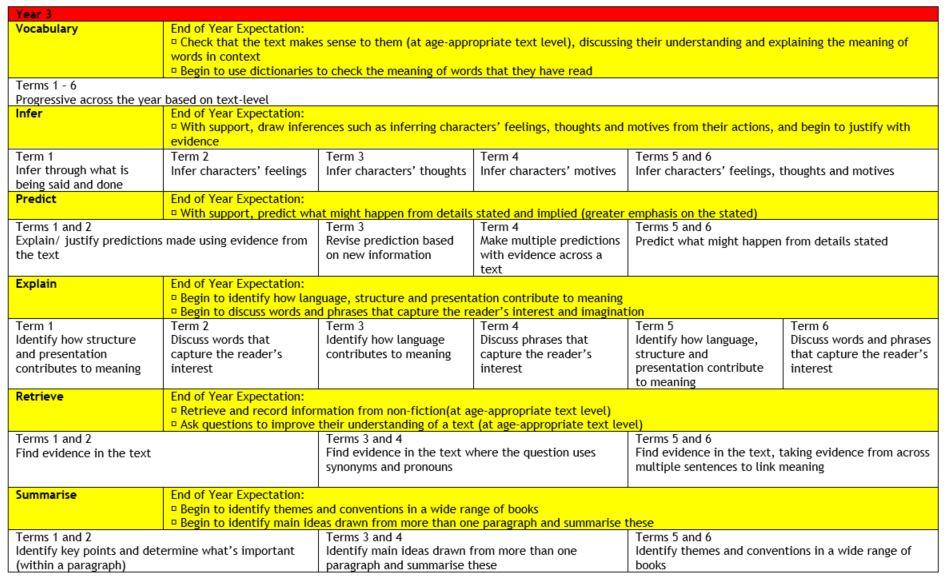
Year 4
Text overview
|
Year 4 |
|||
|
|
Fiction |
Non-Fiction |
Poetry |
|
Term 1 |
|
Explanation |
|
|
|
Frost Hollow Hall- Emma Carroll
The Griffin Gate- Vashti Hardy
A Bear Called Paddington- Michael Bond |
What Have the Romans Done For Us? (Explanation Text)
Digestion (Explanation Text) |
Hot Food- Michael Rosen |
|
Term 2 |
|
Instructions Leaflet/poster |
|
|
|
Malamander- Thomas Taylor
Pippi Londstocking- Astrid Lindgren
Kick- Mitch Johnson |
Rocket Balloon (Instructions)
Inventions that Changed the World (Information Text) |
Chocolate Cake- Michael Rosen |
|
Term 3 |
|
Non chronological report |
|
|
|
Ghost Garden- Emma Carroll
Sky Chasers- Emma Carroll
Mary Poppins- Pamela Lyndon Travers |
Legends of the Deep (Information Text)
Television (Information Text) |
School Tomorrow- Joseph Coelho |
|
Term 4 |
Playscript |
|
|
|
|
The Legend of Podkin One Ear- Kieran Larwood
Kensuke’s Kingdom- Michael Morpurgo
Private Peaceful- Michael Morpurgo
The Secret Garden- Frances Hodgson Burnett |
A Letter Home (Informal Letter)
The Gold Rush (Information Text) |
|
|
Term 5 |
Adventure stories |
|
|
|
|
A Girl Called Owl- Amy Wilson
Animals of Farthing Wood- Colin Dann
The Wonderful Wizard of Oz- Lyman Frank Baum |
Enormous Eruptions (Explanation Text)
The Skeleton (Explanation Text) |
Two Plants- John Agarde |
|
Term 6 |
|
Diary |
|
|
|
The Goldfish Boy- Lisa Thompson
Owen and the Soldier- Lisa Thompson
The Lion, the Witch and the Wardrobe- C.S. Lewis
Swallows and Amazons- Arthur Ransome |
The Amazon River (Information Text)
The Troy Ploy |
|
Year 4 - Progression within reading content domains
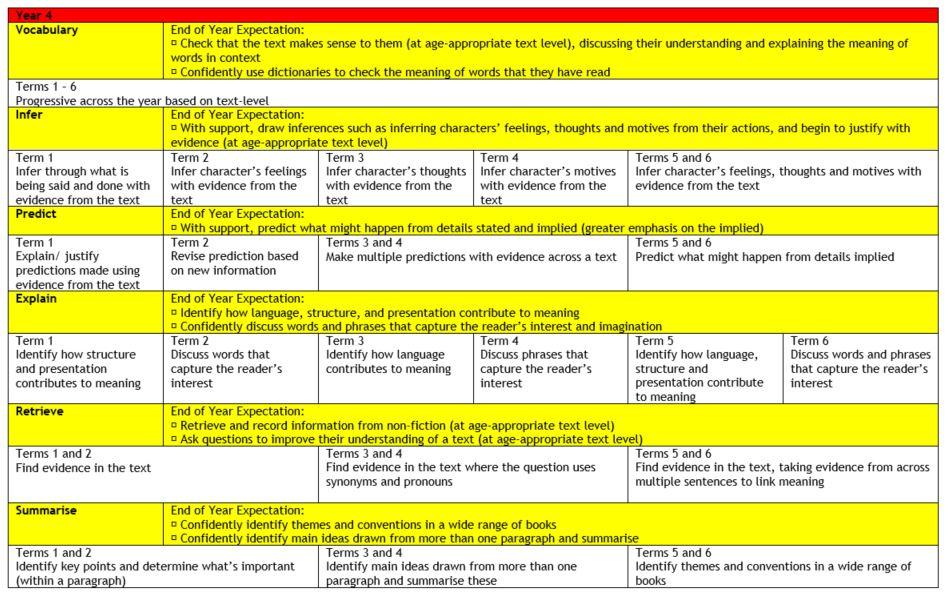
Year 5
Text overview
|
Year 5 |
|||
|
|
Fiction |
Non-Fiction |
Poetry |
|
Term 1 |
|
Recount |
|
|
|
Nowhere Emporium- Ross Mackenzie
The Middler- Kirsty Applebaum
Highland Falcon Thief- MG Leonard |
A Mother’s Diary (Diary)
Evacuee Letter (Informal Letter)
Life Cycle of a Flowering Plant (Explanation Text) |
|
|
Term 2 |
Mystery stories |
|
|
|
|
The House With Chicken Legs- Sophie Anderson
Skellig- David Almond
Clockwork Crow- Catherine Fisher |
Formal Letter (Formal Letter)
EeZeeEyeStrain-Remover (Persuasive Advert) |
Colonel Fazackerley- Charles Causley |
|
Term 3 |
|
Biography and autobiography |
|
|
|
The Castle of Tangled Magic- Sophie Anderson
The Lion Above the Door- Onjali Q Rauf
Star Outside my Window- Onjali Q Rauf |
Soldier’s Diary (Diary)
Kindertransport (Informal Letter) |
The Tyger- William Blake |
|
Term 4 |
|
News interview (shift in formality) |
|
|
|
The Girl Who Speaks Bear- Sophie Anderson
Where the River Runs Gold- Sita Brahmachari
Beetle Boy MG Leonard
|
Trimdon Grange Disaster (Formal Newspaper)
Brave Yank Flies to the Rescue (Informal Newspaper)
Dear Humans (Informal Letter) |
|
|
Term 5 |
Dilemma stories |
|
|
|
|
Oranges in No Man’s Land- Elizabeth Laird
Troofriend- Kirsty Applebaum The London Eye Mystery- Siobhan Dowd
Peter Pan- J.M. Barrie |
Pandemics (Information Text)
The Changing Police (Information Text |
|
|
Term 6 |
|
Balanced argument |
|
|
|
Boy in the Tower- Polly Ho Yen
Cogheart- Peter Bunzl
The Cat Who Walked By Himself- Rudyard Kipling
The Jungle Book- Rudyard Kipling |
Should Animals Be Kept in Zoos? |
If- Rudyard Kipling |
Year 5 - Progression within reading content domains
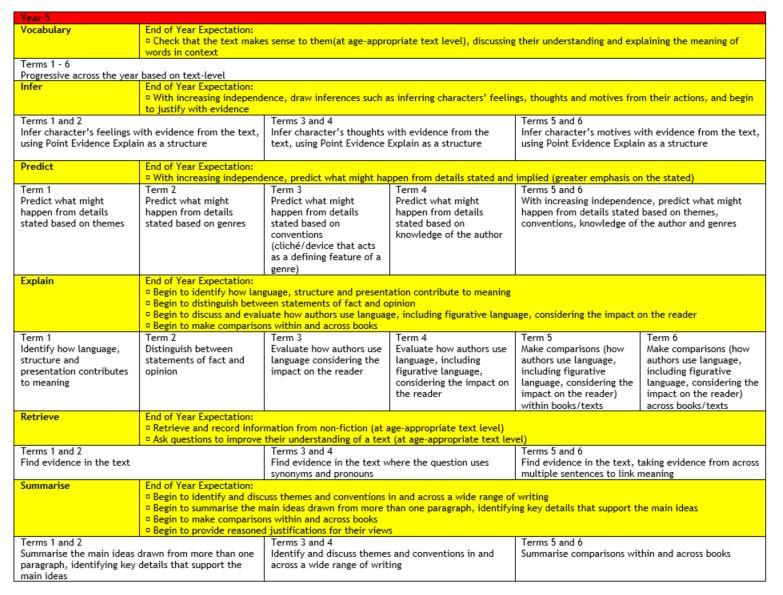
Year 6
Text overview
|
Year 6 |
|||
|
|
Fiction |
Non-Fiction |
Poetry |
|
Term 1 |
|
Persuasive speech |
|
|
|
Sky Song- Abi Elphinstone
The Storm Keeper’s Island- Catherine Doyle
The Graveyard Book- Neil Gaiman
Once- Morris Gleitzman |
Women’s Football (Persuasive Letter)
The Right Not to Work (Non-chronological Report) |
|
|
Term 2 |
|
Formal letter Explanation |
|
|
|
Rooftoppers- Katherine Rundell
The Dreamsnatcher- Abi Elphinstone
Holes- Louis Sachar |
What is Evolution? (Explanation Text)
Serena Williams (Biography) |
I Wandered Lonely as a Cloud- William Wordsworth |
|
Term 3 |
Adventure stories |
|
|
|
|
Brightstorm- Vashti Hardy
The Explorer- Katherine Rundell
The Hound of the Baskervilles- Sir Arthur Conan Doyle
The Wind in the Willows- Kenneth Grahame |
Diary from the Beagle (Diary) |
The Crossover- Kwame Alexander (Narrative verse poetry) |
|
Term 4 |
|
Non-chronological report |
|
|
|
Letters from the Lighthouse- Emma Carroll
The Good Thieves- Katherine Rundell
Wildspark- Vashti Hardy
The Somerset Tsunami- Emma Carroll |
Strange Hearts (Non-chronological Report)
Dia de los Muertos (Information Text) |
|
|
Term 5 |
Dilemma stories |
|
|
|
|
Orphans of the Tide- Struan Murray
Mortal Engines- Phillip Reeve |
A Schoolhouse Letter (Informal Letter)
Greta Thunberg (Biography)
Tim Berners Lee (Biography)
Pickles Saves the World Cup (Newspaper Report) |
|
|
Term 6 |
|
|
|
|
|
The Railway Children- E.Nesbit
Street Child- Berlie Doherty
The Northern Lights- Philip Pullman
Wonder- R.J. Palacio |
|
Invictus- William Ernest Henley
Charge of the Light Brigade- Alfred, Lord Tennyson |
Year 6 - Progression within reading content domains
